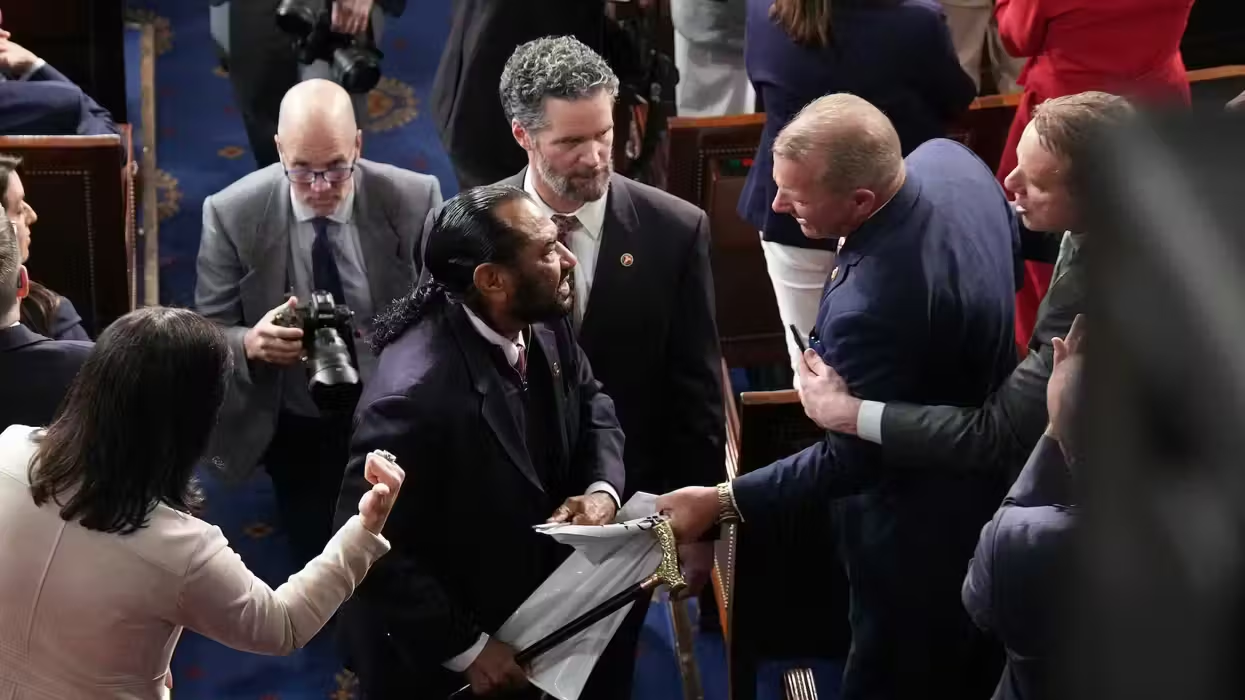
© 2026 Blaze Media LLC. All rights reserved.
"They will kill us and we will kill them!"
(The Blaze/AP)-- Thick black smoke and flames rose Tuesday from the burning roadblock that cut off a highway linking Nigeria's mainland to the islands where the oil-rich nation's wealthy live. The bare-chested young men who live under the bridge said they had had enough.
"This is oligarchy, this is not a democracy!" shouted Danjuma Mohammed, as he stood before the fire holding rocks in his hands. "We are no longer afraid of you! We are ready for war!"
Nigeria appears to be on the brink. A national state of emergency has been declared, and police have been granted the right to search and detain on mere suspicion.
In light of recent widespread protests and violent clashes across the country, Nigeria's President, Goodluck Jonathan, spoke at a church service on Sunday and said that the situation in Nigeria was even worse than the 1967-70 civil war that killed more than a million people.
The President's own words over the weekend were discomforting. "During the civil war, we knew and we could even predict where the enemy was coming from," President Jonathan said, "but the challenge we have today is more complicated" as quoted by London's Telegraph.
The President was referring to the Islamic terrorist group, Boko Haram, which is pushing for a Sharia-compliant Nigeria with a campaign of brutal violence against Christians who make up roughly half the country. The country could soon see spiraling violence as Christians defend themselves -- and possibly retaliate.
The Telegraph surmised that Islamic violence against Christians "has sparked fears of a wider religious conflict in a country whose 160 million population is roughly divided between a mainly Muslim north and predominantly Christian south."
Below is a video showing the recent spate of firebombing attacks against Christian churches by Islamist groups, courtesy of Al Jazeera English:
In Benin City in Nigeria's southwest, an angry mob killed five people and wounded at least six others Tuesday afternoon as they attacked the city's central mosque and a Quranic school, Nigerian Red Cross spokesman Nwakpa O. Nwakpa said. Monday, a mob tried and failed to set a mosque ablaze.
Authorities have tried to control the violence in Nigeria. However, Boko Haram has begun specifically killing Christians in the nation's northeast, leading to a call by a prominent Christian leader for worshipers to begin defending themselves.
The Benin City attack appeared to be a response to those killings.
"It looks like a reprisal from attacks in the north," Nwakpa said. "They took advantage of protests."
Indeed, national strikes, which began Monday in Africa's most populous nation, came after President Goodluck Jonathan's administration removed subsidies Jan. 1 that keep gasoline prices low. Overnight, prices at the pump rose from $1.70 per gallon (45 cents per liter) to at least $3.50 per gallon (94 cents per liter). The costs of food and transportation also doubled in a nation where most live on less than $2 a day.
Jonathan insists that removing the subsidy was the right idea for Nigeria, saving the country an estimated $8 billion a year that he promises will go toward badly-needed road and public projects. However, protesters who have joined the strike under the slogan of "Occupy Nigeria" say the time has come to end government corruption in a nation where military rulers and politicians have stolen billions.
More than 10,000 people again gathered peacefully at a park in Lagos. Elsewhere in the city of 15 million people, crowds remained more tense.
Whether the government can hold back nationwide unrest remains unclear. Soldiers are deployed now in the country's restive central region over fears of ethnic and religious violence, in its northeast to fight Boko Haram and in its oil-rich southern delta to stop militancy. Those operations have had mixed success, while critics say the country's police force is more focused on collecting bribes from civilians than protecting them.
"I will not say it is easy, but we are trying to contain it," said Moses Onireti, a police spokesman in Oyo state, where demonstrations have been large. "These protesters are everywhere, everywhere."
Oyo state, as well as several others, have instated dusk-to-dawn curfews to try and control violent demonstrations.
Unrest could affect oil production in Nigeria, which produces about 2.4 million barrels of oil a day and is a top crude supplier to the U.S. However, most fields remain unmanned and offshore oil fields provide much of its capacity.
Meanwhile, anger in the street continues unabated. At the Ikoyi Island roadblock, a convoy of police escorting a member of the country's elite arrived, with officers loudly loading their Kalashnikov rifles in an attempt to drive the protesters away. Officers put out part of the flaming blockade with an extinguisher, but drove off, leaving the protesters behind.
Another convoy of unarmed officers arrived. They pleaded with protesters for calm but instead they threw stones as the officers put out the flames.
Throughout, the protesters shouted: "They will kill us and we will kill them!"
Want to leave a tip?
We answer to you. Help keep our content free of advertisers and big tech censorship by leaving a tip today.
Want to join the conversation?
Already a subscriber?
more stories
Sign up for the Blaze newsletter
By signing up, you agree to our Privacy Policy and Terms of Use, and agree to receive content that may sometimes include advertisements. You may opt out at any time.
Related Content
© 2026 Blaze Media LLC. All rights reserved.
Get the stories that matter most delivered directly to your inbox.
By signing up, you agree to our Privacy Policy and Terms of Use, and agree to receive content that may sometimes include advertisements. You may opt out at any time.







